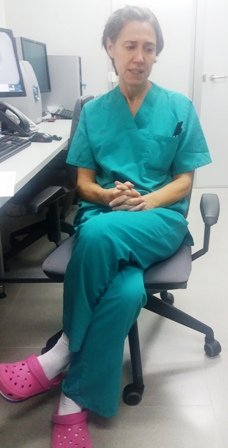During the workshop at a spanish fertility clinic, I took the opportunity to spend some time with Dr. Fina Gomez, a leading embryologist in the IVF lab.
I asked her the kind of questions that we discuss here on the blog; I wanted my readers to hear a real person speak about real issues related to infertility of women over 35.
Interview with an embryologist from an IVF lab: What’s the best age to have a baby?
Me: Dr. Gomez, have you, as an experienced embryologist, ever seen very good, healthy looking eggs in say 45-year-old women?
Dr. Gomez: Women normally have good eggs and embryos up until the age of 35. While it’s possible to have good quality eggs and embryos at an older age, it becomes very individual and very dependent on other factors.
Genetics and lifestyle can play both positive and negative roles. Some of the factors that impact on egg quality are “silent” meaning not easy to clearly identify (mild endometriosis, unidentified infections, psychological issues, etc.).
This is tricky for women over 35 because it may take time to pin the cause of infertility and establish a diagnosis. However, the good news is that with the new technologies, it’s become quite likely that even severe infertility can be cured. But it takes time. That’s why women should calculate this time when planning a family.
 Me: So what do you think is a best age for a woman to have babies?
Me: So what do you think is a best age for a woman to have babies?
Not later than thirty. If women are serious about becoming mothers, they should try to have at least their first baby by the time they turn thirty.
If that works well, then there is still a plenty of time to have more children. But, if any fertility issues appear on the horizon, women who are younger will have enough time to fix it – five years or longer.
Also consider that about 40% of all infertility problems are caused by the male factor (and often remain undiscovered for years, like in the case of mild sperm issues .
Here in Spain, women face the same expectations as in other highly industrialized societies: going to university, securing a job, finding a partner (and who is lucky enough to stay with the same partner for their entire fertile life?)
These tendencies won’t change any time soon. I’d rather see social and biological trends further diverging from each other. That’s why it’s a true gift that women now have the possibility to freeze their eggs while they’re still young. It will take a lot of education for the new generations to understand the benefits of egg freezing, but it will happen.
Me: Some centers prefer ICSI over IVF. When it comes to fertility treatments, which technology is in your opinion more effective in terms of creating healthy babies?
If there is no sperm issue involved, then women should opt for IVF (a quick clarification: ICSI – IntraCytoplasmatic Sperm Injection – involves injecting a single sperm into the egg, whereas IVF enables to an egg to “choose” a sperm that will penetrate).
Some centers perform ICSI almost exclusively because the rate of fertilization is, of course, higher (it’s also more expensive). However, women should consider that the chances of having an epigenetic or chromosomal disease are slightly increased in ICSI children.
Parts of this process are still an uncharted territory and we’ll for sure learn much about it once the ICSI children reach maturity (methods of artificial reproductive technologies are still quite young – the first IVF baby recently turned 35). That’s why ICSI should be performed only when there is a medical indication behind it.
Me: Is there anything that younger women can do in terms of lifestyle to maximize the quality of their eggs Any diet, supplements, exercise? What is it that can best help preserve fertility?
I think the best investment in future fertility is freezing eggs early in life. When women are still young, say 25–26, with one single round of ovarian stimulation she can freeze enough eggs to have reasonable insurance for the future. With those frozen eggsshe can then know that even if it takes time to accomplish the studies, progress with the career or settle down, chances are good that with the right partner she will turn some of her eggs into babies.
Or maybe this young woman will get pregnant naturally at any point along the way and never have to use her egg insurance. But for sure, she can have more relaxed time – a decade or so, and not rush too much with certain important decisions and life choices.
Me: Is egg freezing becoming a business?
In some clinics, for sure, especially smaller or private ones. At our center, this is for sure not the case (Dexeus is a famous university clinic and the place where the first IVF baby in Europe was born).
Our clinic is a large enough ecosystem to accommodate all kinds of interests and individual needs. For example, our cancer patients can chose to have their eggs frozen for free. The idea behind this is that when a young woman is diagnosed with cancer, she typically needs to start radiological treatments immediately (radiation or chemotherapy). Those treatments may severally damage or even eradicate her fertile potential. In such a difficult life situation, it would come as a burden to have to pay for freezing eggs. To help in these extreme cases, we perform fertility preservation at no cost for our patients.
Me: Is there a specific lifestyle modification that helps women save time and get pregnant faster? Is there something like “most common mistakes” that women over 35 could avoid?
In my experience, these two things often create delays: first, discovering the causes of infertility late. Delaying for too long to question the reasons of WHY this particular woman or this particular couple is not able to create a new life.
In praxis, it often takes time to give an answer as there are many levels involved: mechanical (tubes, ovaries), age (how many eggs are left and what is their quality), immunological (including endometriosis), genetic (suspected to cause repeated abortions and unexplained cases of infertility), and even psychological (for we for sure know they exist, only we can’t agree to how much they directly impact on a couple’s fertility).
Second, if simple lifestyle adaptations like timing intercourse and adapting the diet to naturally get pregnant don’t work within a year or so, then women have to seek the help of a specialist.
At some point, a woman might need to enter fertility treatments. This means, her ovaries will be stimulated with high doses of hormones (same ones as her body normally produces, only in much higher dosages). And here comes the next bottleneck: not all women respond equally well to the stimulation protocols and it takes time to find the right one. Add the time that passes between treatments and you will realize that even several years can easily go by.
In theory, the stimulation protocols should be as individual as the first part of the equation (finding causes of infertility). One stimulation protocol for one woman and an individualized approach in fertility treatments: that’s the future trend in our profession.
Me: Taking individual approach takes time. It’s often not realistic that fertility doctors can take much time to deal with a single patient. So what is the solution?
Better communication among all sides involved.
This starts with communication between women and men (most men don’t like having their sperm tested – this seems to be a universal issue and also an important first obstacle tha tfurther delays progress). Gynecologists often waste their patients’ fertile time by not having them test their ovarian reserve properly and not sending them to fertility specialists on time.
Many women are totally unaware of the different roles that gynecologists and reproductive endocrinologists play when it comes with dealing with infertility. Finally, when a woman finally arrives at the fertility center, there will be a lot of good communication needed between her doctor and a biologist or embryologist, or maybe between herself and a psychologist (most centers still haven’t arrived at this point of integrating all involved sides). These processes take time, but we’re getting better at it.
Thank you Dr. Gomez for the insightful information!
Supplements which are scientifically proven to increase egg quality:
To know when you ovulate:
Prenatal vitamins:















